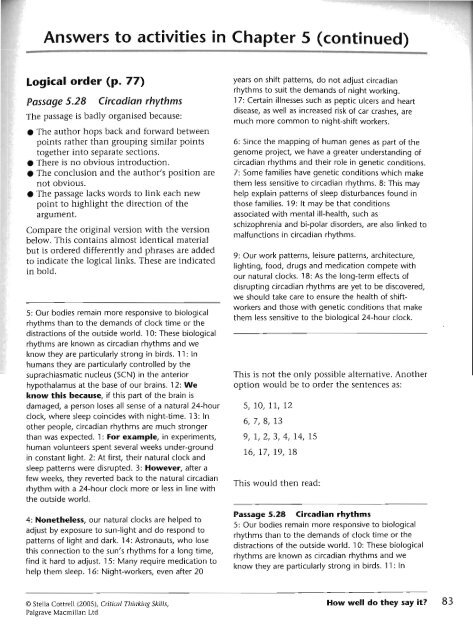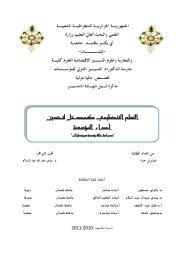Critical Thinking Skills - Developing Effective Analysis and Argument(2)
Critical Thinking Skills - Developing Effective Analysis and Argument(2)
Critical Thinking Skills - Developing Effective Analysis and Argument(2)
Create successful ePaper yourself
Turn your PDF publications into a flip-book with our unique Google optimized e-Paper software.
Answers to activities in Chapter 5 (continued)<br />
Logical order (p. 77)<br />
Passage 5.28<br />
Circadian rhythms<br />
The passage is badly organised because:<br />
The author hops back <strong>and</strong> forward between<br />
points rather than grouping similar points<br />
together into separate sections.<br />
There is no obvious introduction.<br />
The conclusion <strong>and</strong> the author's position are<br />
not obvious.<br />
The passage lacks words to link each new<br />
point to highlight the direction of the<br />
argument.<br />
Compare the original version with the version<br />
below. This contains almost identical material<br />
but is ordered differently <strong>and</strong> phrases are added<br />
to indicate the logical links. These are indicated<br />
in bold.<br />
5: Our bodies remain more responsive to biological<br />
rhythms than to the dem<strong>and</strong>s of clock time or the<br />
distractions of the outside world. 10: These biological<br />
rhythms are known as circadian rhythms <strong>and</strong> we<br />
know they are particularly strong in birds. 11: In<br />
humans they are particularly controlled by the<br />
suprachiasmatic nucleus (SCN) in the anterior<br />
hypothalamus at the base of our brains. 12: We<br />
know this because, if this part of the brain is<br />
damaged, a person loses all sense of a natural 24-hour<br />
clock, where sleep coincides with night-time. 13: In<br />
other people, circadian rhythms are much stronger<br />
than was expected. 1 : For example, in experiments,<br />
human volunteers spent several weeks under-ground<br />
in constant light. 2: At first, their natural clock <strong>and</strong><br />
sleep patterns were disrupted. 3: However, after a<br />
few weeks, they reverted back to the natural circadian<br />
rhythm with a 24-hour clock more or less in line with<br />
the outside world.<br />
4: Nonetheless, our natural clocks are helped to<br />
adjust by exposure to sun-light <strong>and</strong> do respond to<br />
patterns of light <strong>and</strong> dark. 14 Astronauts, who lose<br />
this connection to the sun's rhythms for a long time,<br />
find it hard to adjust. 15: Many require medication to<br />
help them sleep. 16: Night-workers, even after 20<br />
years on shift patterns, do not adjust circadian<br />
rhythms to suit the dem<strong>and</strong>s of night working.<br />
17: Certain illnesses such as peptic ulcers <strong>and</strong> heart<br />
disease, as well as increased risk of car crashes, are<br />
much more common to night-shift workers.<br />
6: Since the mapping of human genes as part of the<br />
genome project, we have a greater underst<strong>and</strong>ing of<br />
circadian rhythms <strong>and</strong> their role in genetic conditions.<br />
7: Some families have genetic conditions which make<br />
them less sensitive to circadian rhythms. 8: This may<br />
help explain patterns of sleep disturbances found in<br />
those families. 19: It may be that conditions<br />
associated with mental ill-health, such as<br />
schizophrenia <strong>and</strong> bi-polar disorders, are also linked to<br />
malfunctions in circadian rhythms.<br />
9: Our work patterns, leisure patterns, architecture,<br />
lighting, food, drugs <strong>and</strong> medication compete with<br />
our natural clocks. 18: As the long-term effects of<br />
disrupting circadian rhythms are yet to be discovered,<br />
we should take care to ensure the health of shiftworkers<br />
<strong>and</strong> those with genetic conditions that make<br />
them less sensitive to the biological 24-hour clock.<br />
This is not the only possible alternative. Another<br />
option would be to order the sentences as:<br />
5, 10, 11, 12<br />
6, 7, 8, 13<br />
9, 1, 2, 3, 4, 14, 15<br />
16, 17, 19, 18<br />
This would then read:<br />
Passage 5.28 Circadian rhythms<br />
5: Our bodies remain more responsive to biological<br />
rhythms than to the dem<strong>and</strong>s of clock time or the<br />
distractions of the outside world. 10: These biological<br />
rhythms are known as circadian rhythms <strong>and</strong> we<br />
know they are particularly strong in birds. 11: In<br />
O Stella Cottrell (2005), Cliticnl Thii7killg <strong>Skills</strong>,<br />
Palgrave Macmillan Ltd<br />
How well do they say it 83



